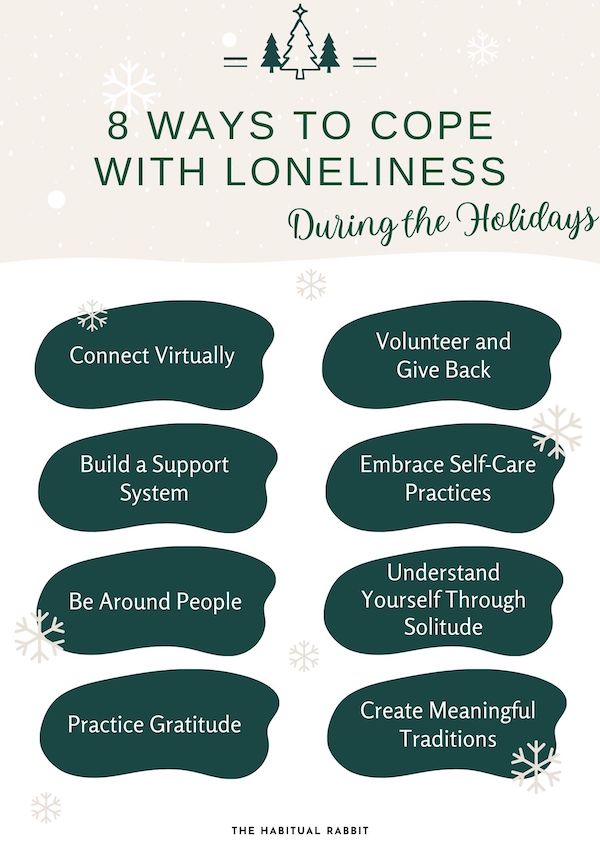
The prospect of spending my first holiday season alone feels intimidating, yet liberating. In the past, I’ve always had the comforting presence of family or friends nearby. However, this time, I’m in a completely new environment without that safety net.
Being in Kuala Lumpur, a city I’m still getting to know, adds an extra layer to this experience. While it is a challenge, it’s also an opportunity for me to create my routine and meet new people…15,000 km away from home. It’s a bit like exploring the unknown, and that’s something to look forward to amid the solitude.
Preparing to spend the holidays alone has helped me gain a deeper appreciation for the resilience of those who navigate the holiday season alone, whether by circumstance or choice. Location, loss, personal circumstances, work commitments, and social isolation are just a few reasons people tend to feel alone during this time of year.
Whatever it may be, acceptance is the first step to overcoming loneliness; acknowledge and validate your emotions. While you may be feeling alone in your life right now, and I know the holidays can amplify that feeling, know that you’re not alone.
It’s all perspective. For me, I’m excited about uncovering new insights about myself during this time of introspection and using it as an opportunity to be with myself. As I navigate these waters for the first time, I hope to share with you some insights that have been helping me.
From fostering virtual connections to embracing solitude, each strategy is designed to empower you to cope with loneliness and take a step toward rebuilding a sense of belonging and warmth.
Connecting virtually
One of the greatest advantages we have of our time is technology. With this, we’ve been able to stay connected with our friends and family across the globe. Since I’m a digital nomad, it’s hard to see my friends in person as much as I’d like. So every so often, I set up calls with my friends to catch up on life.
Whether it’s a text, a warm voice call, or a virtual face-to-face chat, these connections can be a lifeline during the holiday season. Take the initiative to plan virtual activities that go beyond words – engage in lively games, host movie nights, or even cook up a storm together online. Sometimes, it’s the simplicity of doing nothing together that makes these virtual connections feel like a warm hug, creating a sense of togetherness that transcends physical boundaries.
Don’t underestimate the power of online communities or groups where you can find those with similar interests or seek comfort in a supportive network that understands. These interactions can go a long way and who knows, maybe you’ll meet a friend or two along the way.
Since Jess and I have been long-distance, we’ve set up our FaceTime calls for 3 times a week. Every Sunday night for Jess and Monday morning for me, we debrief our “weekend viewing” activities (we basically discuss the movies or shows we watched over the weekend and do a review and reflection).
Our weekend viewing briefing is so special because it digs deep; you can’t be a part of this conversation if you haven’t taken the time to think about what you’ve watched. For me, besides analyzing the story, acting, editing, etc., I’m connecting it to my life experiences. “Why does this scene resonate with me so deeply”, “Why am I infuriated by this character’s actions”, and “What can I learn from its underlying message to improve my current predicament?”
When you’re connecting virtually, go beyond the surface talk of “How was your day?” or “What did you do today?” I challenge you to go deeper into the conversation to share thoughts, feelings, and insights. Better yet, find something to do or enjoy together so that you can discuss it.
While connecting virtually, I recommend staying off of social media altogether during the holiday season, especially if you’re feeling lonely. Social media comparison is one of the most triggering thought traps you could fall into during the holiday season, and it will amplify your loneliness.
Volunteering and giving back
Some might say that the holiday season is about giving back to the community, and I’d agree. It’s also a way to help you cope with loneliness during this time. Engaging in volunteer work or contributing to local charities is not just an altruistic gesture; it’s a great opportunity to make a positive impact on the lives of others while simultaneously fostering a deep sense of connection and purpose within yourself.
Whether it’s participating in a food drive, lending a helping hand at a shelter, joining a community clean-up initiative, or getting involved in a fundraising event – you open the door to a world where meaningful connections can be made. These gatherings offer a unique chance to bond with like-minded individuals who share a common commitment to making a difference.
When you volunteer and give back to those in need during the holiday season, the impact reverberates far beyond the immediate act of giving. Not only do you contribute to the betterment of your community, but you also experience a profound boost in your own emotional and mental well-being.
Holidays, at their core, are a time for reflection on our fortunes and an opportunity to express gratitude by giving back to those less fortunate. Breaking free from the isolating mentality of “you and only you,” volunteering helps you transcend yourself, allowing you to see your place within a community, as part of something greater than just yourself.
At the root of it all, choose volunteer opportunities that align with your values, ensuring that your contribution is not just a gesture but a meaningful reflection of the kindness and compassion that defines the holiday spirit.
Building a support system
It goes without saying that everyone should have a strong support system; we all need a friend, someone we can confide in, especially during difficult times. Building a strong support system is a pivotal step in navigating and overcoming loneliness, particularly during the holiday season.
One cornerstone of this strategy is connecting with friends and family, sharing your feelings openly, and clearly communicating the type of support you need. People can’t read your mind and be there for you if you don’t let them know what’s going on.
Take a moment to compile a list of individuals, past and present, who have positively impacted your life – these are the pillars of your support system. Recognizing the people who have been there for you in various capacities strengthens your sense of belonging and provides a network to lean on during times of loneliness.
It’s also a good reminder to yourself that you have people in your corner, even when you’re stuck in a dark place and can’t feel it.
When loneliness becomes overwhelming, seeking professional help, such as therapy or counseling, is a healthy approach. But it’s also important to consider this option even if the loneliness feels manageable. Therapy offers a structured environment to address and reframe negative self-narratives that often emerge during lonely periods with a professional.
One of the things I’m grateful for is having my weekly therapy calls with my therapist on BetterHelp. I’ve been using BetterHelp since 2017, and it has made such a huge impact on my life. I’ve been with my therapist for over 3 years, and during this time, I’ve had calls with her while living in at least 7 different countries and 5 different time zones. Despite the constant changes and her living in Los Angeles, she has been extremely helpful and kind throughout each transition.

If you already have a therapist, prioritize attending scheduled appointments, maximizing the opportunity to navigate through struggles and gain valuable insights.
When I first started out, I would often cancel sessions with whatever excuses I had – too busy, too stressed, too tired, too depressed. But I was only hurting myself because those were the times I needed my calls the most. Now, I see my calls as a commitment to myself, my health, and my well-being. And now, I can’t recall the last time I skipped a session.
Yes, I will still feel lonely at times. Living in 4 different countries this year, alone, can do that to you. And being alone can also cause a lot of negative thoughts to circulate in my mind. This is why it’s so important to work through them with a professional whose goal is to help you work through your thoughts.
Ultimately, therapy serves as a powerful tool to remind people that the loneliness they are experiencing is a transient emotion, and that, like all feelings, they come and they go. Therapy, specifically BetterHelp, has been an anchor of mine in my world of nomadland.
Embracing self-care practices
I can’t stress enough how important it is to practice self-care, especially during the chaos of the holidays. Your self-care habits are not only a crucial lifeline in times of high stress, but they help to build the mental resiliency that’ll get you through loneliness.
Incorporating mindfulness techniques, like meditation or calming breathing exercises, creates a sanctuary for the mind to find peace and restore balance. Equally transformative are the basics of self-care – paying attention to nutrition, engaging in regular exercise, and ensuring quality sleep (as we’ve mentioned in so many previous articles). Nurturing your physiological well-being not only enhances your overall health but also significantly impacts your emotional state.
When motivation is scarce, especially during low points, reinforcing the importance of activities like exercise and meditation becomes paramount. It’s a challenge that requires a conscious effort to overcome by telling yourself, “I may not feel like doing it, but this is precisely why I need it the most.” I have to remind myself of this quite often.
Do things that bring you joy. What makes you happy? What do you enjoy doing? Creating a list of things that bring joy and require minimal effort allows you to easily access these sources of comfort during moments of struggle. Pampering yourself is another aspect of self-care, whether through a relaxing massage, a spa day, or a soothing facial skincare routine at home. But keep in mind that it’s important to seek healthy outlets for self-indulgence. Opt for activities that promote well-being, rather than indulging in unhealthy habits.
When I say pamper yourself or “treat yourself”, I don’t mean gorging on a meat lover’s pizza, downing a six-pack while watching football, and passing out on the sofa!
Being around people
In general, I’m more introverted and naturally don’t like to be around many people. But I’ve come to understand that the concept of “being around people” doesn’t mean I need to be with people. For me, simply being around others can help to ease my loneliness.
Something that I used to struggle with was doing group exercises, like a fitness class, because I didn’t want to work out with anyone besides myself. Recently, I finally challenged myself and got a ClassPass membership, which allows me to join fitness classes at a variety of studios with a wide range of workouts.

I got out of my comfort zone, integrated myself into a community (even if it’s just a 45-minute session), and attended a spinning class. And to my surprise, it was so much fun! What blew my mind was that I couldn’t remember having this much fun and being this pumped up during and after a workout.
Had I talked myself out of it, I wouldn’t have experienced the euphoria I get from spinning class, while meeting many people who, like me, care about their mental and physical health. Had I talked myself out of it, I wouldn’t have made it a part of my weekly exercise routine, like I have done now.
I’m also making more of an effort to be around other people by signing up for a coworking monthly pass. While I much prefer to work at home by myself (and I thrive off of it), I understand the importance of just being outside of my living space and around other people. I also have the tendency to stay and get too comfortable in my own bubble, which unfortunately amplifies my loneliness. There are days when I don’t feel like interacting, but I still make an effort to go out, even if it’s to work at a coffee shop, buy groceries, or go for a walk. More often than not, being around people alleviates the mental burden, even if it’s just a little.
I know it can be hard, but here is how you can start:
Find a public space where you feel comfortable and maybe bring a book to read or a cup of coffee to enjoy; listen to the sounds of the people and nature around you. You may still feel lonely, but you may also feel less isolated. This is also a great way to practice mindfulness.
Smile at strangers, say hello to neighbors, and if you’re feeling confident, strike up a conversation! It creates an entryway for connection, even if it’s a small, micro-connection.
If you’re an introvert who is living abroad or moving to a new place, explore events in your community either to connect with others or just to be out there. Consider joining clubs or classes to meet new people with similar interests and passions. Often showing up over and over, even when we don’t feel like it, is the key to making connections.
So sign up for an activity that requires you to engage with others, like a language class or hiking group. Keep going every week and make a point to talk to people; this is a great way to foster new friendships.
The goal here doesn’t have to be about getting rid of loneliness. Sometimes it’s about experiencing joy from doing the activities that bring us joy so that we remind ourselves that loneliness isn’t the only thing we are feeling—it can exist alongside other emotions too.

Understanding yourself through solitude
Embracing this alone time for introspection and changing my perspective about loneliness has given me profound insights into my emotions, values, and priorities. While the holiday season is often marked by gatherings, it can also serve as an opportunity for self-discovery.
For those spending the holidays alone, embarking on solo travels can be a transformative experience, whether it’s a road trip, a sunny destination, a relaxing all-inclusive resort, or a week or two adventuring a different continent (make sure to do your research and prepare though). And even if you’re staying put, you can explore your own city or town and see it in a different light. By engaging in solo activities that spark joy and fulfillment, you can really turn moments of solitude into opportunities for personal growth and exploration.
Traveling alone and doing solo activities has been a common theme in my life for the past year. If you’ve never done it before, I can understand why it would be intimidating. But honestly, it’s the best thing you can do for yourself, with yourself.
People fear being alone for different reasons, and I think it is one of the saddest things in life to not know how to be with yourself, to develop a relationship with yourself. I have learned the most about myself through solitude, especially through solo trips.
When I’m by myself, soaking in my environment, recognizing what emotions I’m feeling, and trying to dig deeper as to why I feel this way, I tend to have “emotional epiphanies” and it’s the coolest thing to ever experience.
This process definitely requires me to be present and “set intentions”; to be receptive towards the idea of learning and understanding myself and to take in external stimuli and relate them to myself as opposed to letting things pass by without a second thought. It truly is like hanging out and building a relationship with yourself.
The funny thing is when I talk to people about my travels, there is a sort of disconnect in the conversation. When people ask about travel, they’re usually asking about the place itself – the people, the food, the sights, the shopping, the parties, the weather.
But when I think of the places I’ve been to, the thing that resonates with me most is what I learned about myself while being there; how this place impacted and changed the trajectory of my life, my way of being, my way of thinking.
To give you an example, my trip to Bali in 2017 taught me how to be alone. It was my first extended solo trip, and it was the first place I learned to develop a relationship with myself. I traveled all over the island by myself for 3 weeks and met wonderful people along the way, locals and tourists (I should’ve made more effort to keep in contact with them). At times, it was super uncomfortable dealing with my thoughts. My inner voice was like that roommate that wouldn’t shut up. But I learned so much about myself during that time. I felt a deeper sense of connection through understanding myself better. More importantly, I learned how to be free for the first time and got a taste of how liberating that felt.
If this is something you want to try out, I recommend that along the way, you encourage the acceptance of your emotions and practice self-compassion. It’s essential to go easy on yourself as you begin to foster a deeper and more positive relationship with yourself!
Practicing gratitude
Of course, we can’t talk about solitude and mindfulness without mentioning gratitude. It’s such an important part of coping with loneliness. Usually, it is in your times of solitude that you feel a stronger sense of gratitude for the people who provide quality company and care for you.
Don’t forget to be grateful for yourself, for staying with yourself during this tough time. You could easily just drown out your thoughts with alcohol or recreational substances, but instead, you did the hard work of being with yourself to understand yourself.
So tell yourself, “Thank you for staying with me.”
Carve out some time to reflect on and document moments of gratitude and love, especially for those afar. By doing so, you can shift your focus from what’s lacking to the abundance that already exists. There’s a lot to be thankful for.
I encourage you to share your gratitude and love with friends and family, to practice verbalizing your feelings of thankfulness.
Beyond that, reflect and feel the gratitude and love for those who have passed and are no longer with you; your love for them is what remains.
This quote from the movie Interstellar shows how powerful the concept of love is when dealing with the vastness, emptiness, and extreme isolation within space, which is loneliness on a whole new level.
“Love is the one thing we’re capable of perceiving that transcends dimensions of time and space.”
The quote’s meaning is that love is a tangible force that can transcend time and space. It’s possible to love someone, even if they are dead or not present in our time. Love is not a dimension, but it moves across time like gravity.
The film explores how love is bound to time through sentimentalism, grief, and the acceptance that loved ones can exist after death. This concept helps me deal with my grief; of how my love and gratitude for someone I’ve lost grows stronger as time passes, while my memory of them starts to fade, piece by piece.
Through the intentional practice of gratitude, I hope you can find peace and connection, cope with loneliness, and transform the holiday season into a celebration of meaningful relationships.
Create meaningful traditions
A fun and proactive way to challenge your holiday loneliness is to create some new traditions. Whether you’re sharing this with friends virtually or you’re doing something new on your own, come up with new meaningful rituals that align with your interests and values. This is a way for you to take control of your situation and redefine what the holidays mean for you.
Share these great ideas with your friends and family, even if they’re miles apart. Together, you can cook up some memorable experiences that bring the holiday cheer, making it a group celebration no matter the distance.
While resetting expectations and memories to form new traditions can be challenging, I promise it’s worth it. If you’re navigating the holiday season alone like me, relying solely on yourself becomes a catalyst for understanding what brings you genuine joy and fulfillment.
Final Thoughts
It’s not easy being alone during the holidays. Or perhaps, you’re not alone, but feeling lonely nonetheless. Many of these strategies we’ve shared here on the blog are not just for the holidays, but they can be instrumental in helping you cope with the feeling of loneliness during the holiday season.
From volunteering and giving back to embracing self-care practices and creating meaningful traditions, these strategies will help you to form a foundation of resilience and empowerment. As you reflect on these insights, consider the ones that resonate most with you and weave them into your holiday.
The holiday season becomes not just a time of solitude but an opportunity for personal growth, meaningful connections, and a celebration of the strength that resides within each of us. Remember, you are not alone.

